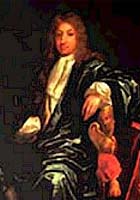Dreams Poem by John Dryden
Dreams
Dreams are but interludes which Fancy makes;
When monarch Reason sleeps, this mimic wakes:
Compounds a medley of disjointed things,
A mob of cobblers, and a court of kings:
Light fumes are merry, grosser fumes are sad;
Both are the reasonable soul run mad;
And many monstrous forms in sleep we see,
That neither were, nor are, nor e'er can be.
Sometimes forgotten things long cast behind
Rush forward in the brain, and come to mind.
The nurse's legends are for truths received,
And the man dreams but what the boy believed.
Sometimes we but rehearse a former play,
The night restores our actions done by day;
As hounds in sleep will open for their prey.
In short, the farce of dreams is of a piece,
Chimeras all; and more absurd, or less.
Indeed absurd and forgotten things linger in night dreams. John Dryden has expressed all the facts of dreams in this poem of his very well!
John Dryden graduated Westminster School as a King's Scholar where Dr. Richard Busby, was his headmaster. Westminster School had a religious and a political quintessence that encouraged royalism and high Anglicanism through instructing the pupils in the rhetorical analysis and art and through teaching them to engage in arguments. The Anglican Church' structure followed to its source, the reign of King Henry VIII, who had petitioned Pope Clement VII for an annulment of his first marriage because he needed a son with his next wife. This petition was denied. During this reign of King Henry VIII, the Parliament passed a series of important laws including the one that deprived the Roman Catholic Church of any authority. The King became “the supreme head of the church in England, ” and the religion in the Anglican Church transformed into a combination of Catholicism and Protestant Reformation theology. This church emboldened its fellows ''to join in the process of discovery.'' In this context, John Dryden translated Virgil's Aeneid. He wrote in his English version: ''Light as an empty dream at break of day, Or as a blast of wind, she rush'd away. Thus having pass'd the night in fruitless pain, I to my longing friends return again'' The first line clearly proves that Virgil had an influence on Dryden in this process of searching for the Light. In ''Ode to Mrs. Anne Killigrew'', the poet wrote: ''Light as the vapors of a morning dream; So cold herself, whilst she such warmth expressed, ’Twas Cupid bathing in Diana’s stream.'' It was a process of searching for love. Also, in ''Œdipus'', ''Tir. 'Tis Œdipus indeed: Your king more lawful Than yet you dream; for something still there lies In heaven's dark volume, which I read through mists: '' Much more, in ''Wife of Bath's Tale'', ''Then courts of kings were held in high renown, Ere made the common brothels of the town. There virgins honourable vows received, But chaste, as maids in monasteries, lived. The king himself, to nuptial rites a slave, No bad example to his poets gave; And they, not bad, but in a vicious age, Had not, to please the prince, debauched the stage.'' He explored the theological differences between the Catholic Church and the Anglican Church. Thomas Green wrote about his work, His Hind demonstrates, what I have often thought, but tremble to express, that the first step of separation from the Church of Rome, was the first step to infidelity. Percival Stockdale mentioned in one of his works, ''to give poetry to controversial, and scholastick theology; was reserved, by the God of Nature, for the genius of Milton, and of Dryden.'' In order to find arguments, he wrote about the King's dream, about what the King did not say but thought- an intimacy of the thinking that was expressed through dreams. ''Light fumes are merry, grosser fumes are sad; Both are the reasonable soul run mad; And many monstrous forms in sleep we see, That neither were, nor are, nor e'er can be.'' The beautiful royal ideals remained forgotten in the childhood period- beautiful poem. Voted 10.
This poem has not been translated into any other language yet.
I would like to translate this poem
Woooooooooooooooooow......exquisite stuff, l triple like